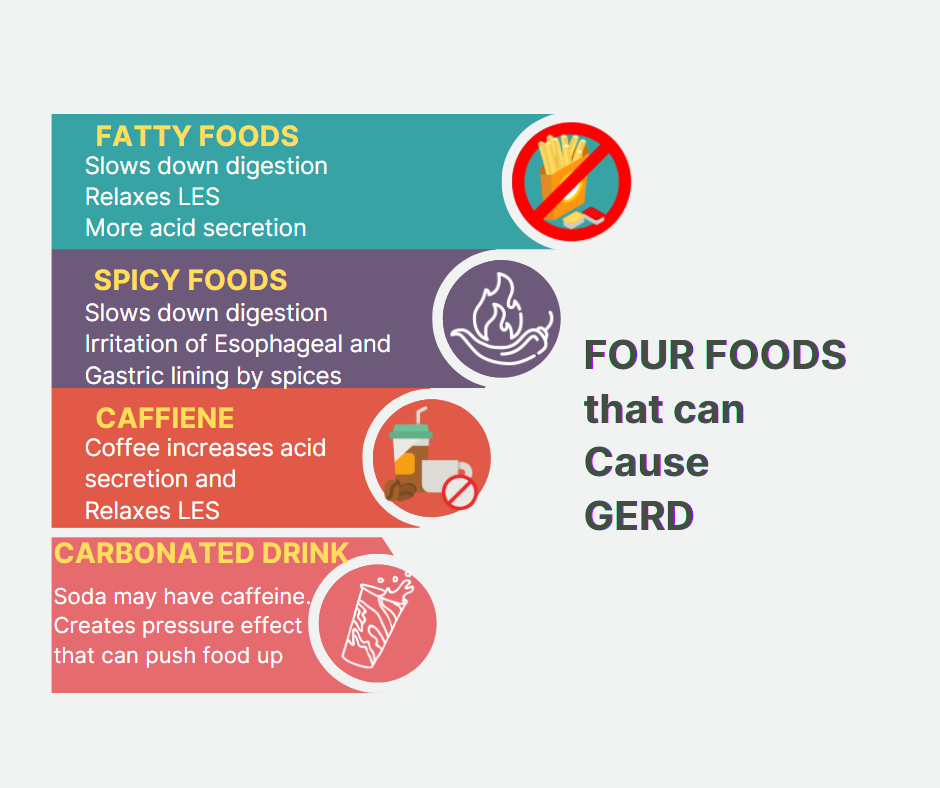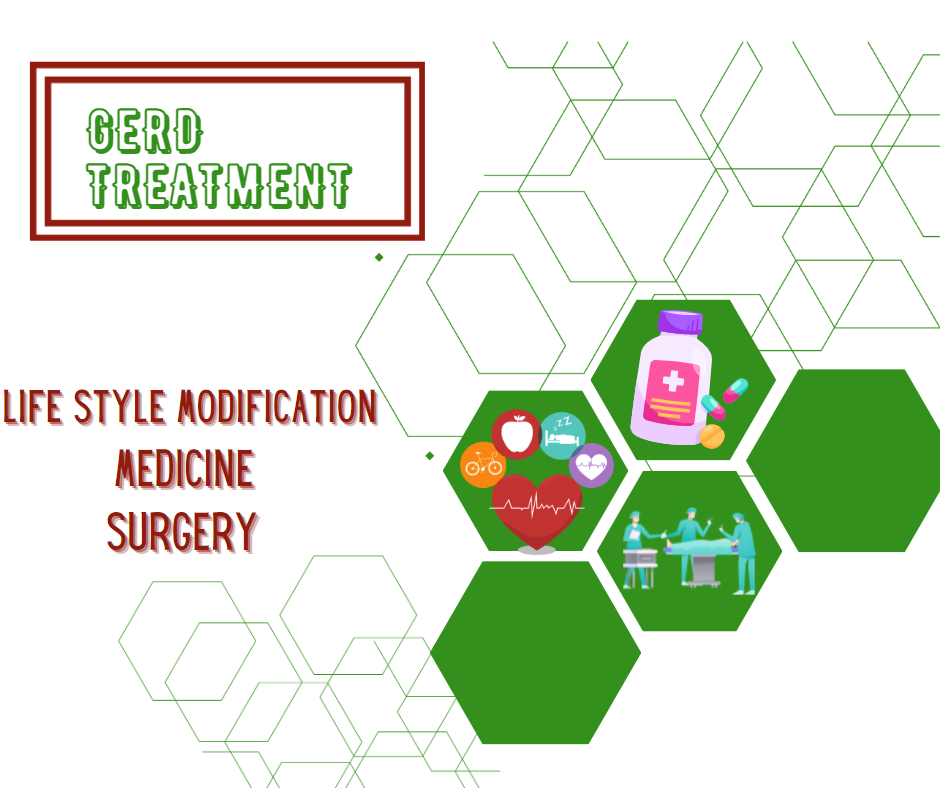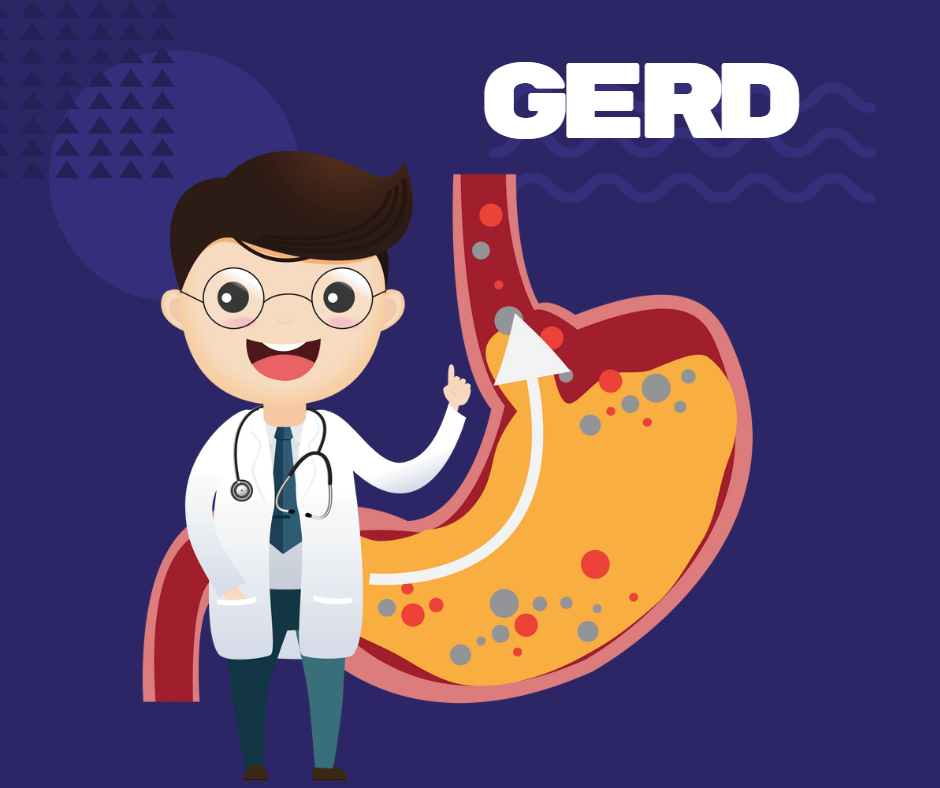Gastroesophageal reflux disease, also called GERD, is a common, chronic digestive disorder affecting millions worldwide. In this blog, we will discuss the definition, causes, symptoms, treatment, and complications of GERD.
WHAT IS GERD
The regurgitation of acid from the stomach to the esophagus results in irritation and inflammation this is acid reflux. If these episodes occur frequently and the patient has a long history then the condition is labeled as GERD.
The esophagus is the tube that connects the mouth to the stomach, and the lower esophageal sphincter (LES), (a functional sphincter, not an anatomical one, at the bottom of the esophagus), normally closes after food passes into the stomach, preventing the contents of the stomach from flowing back up. However, in people with GERD, the LES does not function properly, allowing acid and other stomach contents to reflux into the esophagus.
For understanding the underlying process of Heartburn, acid burn, and GERD in detail check out the post: What is HEARTBURN; causes, treatment; a common presentation worldwide
Causes Of GERD
Several factors contribute to GERD development, including:
Abnormalities in the lower esophageal sphincter (LES): The LES can be weak or relaxed inappropriately, allowing stomach acid to reflux into the esophagus. Various foods, beverages, and medicine can affect its function. Moreover, obesity and pregnancy can also affect its function by exerting pressure on the stomach.
Hiatal hernia: This condition in which the upper part of the stomach protrudes through the diaphragm into the chest cavity, impairing the esophagogastric junction which in turn makes the lower esophageal sphincter weak and contributes to the development of GERD.
Delayed gastric emptying: When the stomach takes longer than usual to empty its contents, it increases the risk of reflux.
Obesity: Excess weight puts pressure on the stomach and can contribute to developing GERD.
Pregnancy: The hormonal changes slow digestion down and progesterone impairs lower esophageal sphincter function. Moreover, the growing size of the uterus can put pressure on the stomach and contribute to the development of GERD.
Adhorhydria:
Achlorhydria is a medical condition characterized by the absence or reduced production of hydrochloric acid (HCl) in the stomach. Hydrochloric acid plays a crucial role in the digestive process by helping to break down food and kill harmful bacteria in the gut. When the stomach does not produce enough HCl, it can lead to various digestive problems, including GERD, improper digestion, and abdominal bloating.
In individuals with achlorhydria, the lack of stomach acid can cause food to remain in the stomach longer than usual, leading to increased pressure on the lower esophageal sphincter (LES). This increased pressure can cause the LES to weaken and allow stomach acid to flow back into the esophagus, leading to the symptoms of GERD.
Certain foods and beverages: Spicy or acidic foods, caffeine, alcohol, and carbonated drinks can all contribute to the development of GERD.

Symptoms
The most common symptoms of GERD are:
Heartburn: A burning sensation in the chest that may radiate up to the neck or throat due to the backflow of stomach acid into the food pipe.
Regurgitation: The backflow of solid or liquid foods reaching the mouth.
Difficulty swallowing: The feeling of food getting stuck in the throat or chest.
Chest pain: This can be a symptom of GERD, but it is important to rule out more serious conditions such as a heart attack.
Other less common symptoms of GERD include coughing, hoarseness, a sour taste in the mouth, and asthma.
Treatment of GERD:
Treating GERD through Lifestyle Modification
The treatment depends on the individual symptoms and the severity of the condition. In many cases, lifestyle modifications can help to reduce symptoms. These modifications include:

Avoiding trigger foods and beverages: Spicy or acidic foods, caffeine, alcohol, and carbonated beverages can all contribute to the development of GERD, so it’s important to avoid them.
Eating smaller, more frequent meals: This can help to reduce pressure on the LES.
Losing weight: Excess weight puts pressure on the abdomen and can contribute to developing GERD, so losing weight can help reduce symptoms.
Elevating the head of the bed: Sleeping with the head end of the bed slightly elevated or by using pillows can help reduce symptoms by preventing stomach acid from flowing back into the esophagus.
Medications for Treating GERD:
In addition to lifestyle modifications, medications can also be used to treat GERD. These medications include:
Antacids: These neutralize stomach acid and can provide immediate relief of symptoms.
H2 blockers: These reduce the amount of acid produced by the stomach and can provide longer-lasting relief of symptoms.
Proton pump inhibitors (PPIs): These are the most effective medications for treating GERD. They reduce the amount of acid produced by the stomach and can provide long-term relief of symptoms.
Consult health care professionals before starting any medical treatment.
In some cases, surgical interventions may be necessary to treat GERD.
Surgical options include:
Fundoplication involves wrapping a portion of the upper stomach around the lower esophagus to reinforce the lower esophageal sphincter.
LINX, which involves implanting a ring of magnetic beads around the lower esophageal sphincter to help prevent reflux.
For more details regarding home remedies, and medical and surgical options visit the post “Acid Reflux Management: Effective GERD Treatment Options”
Complications
Untreated or poorly managed GERD can lead to a range of complications. Chronic inflammation and irritation of the esophagus can lead to esophagitis, narrowing of the esophagus, and even precancerous changes in the tissue. The acid can also cause tooth decay and respiratory problems such as asthma and pneumonia. People with GERD are also at increased risk of developing Barrett’s esophagus, a condition in which the cells lining the esophagus are replaced by abnormal cells, which can increase the risk of esophageal cancer. Therefore, seeking medical attention and following a treatment plan to manage GERD and reduce the risk of complications is essential.


